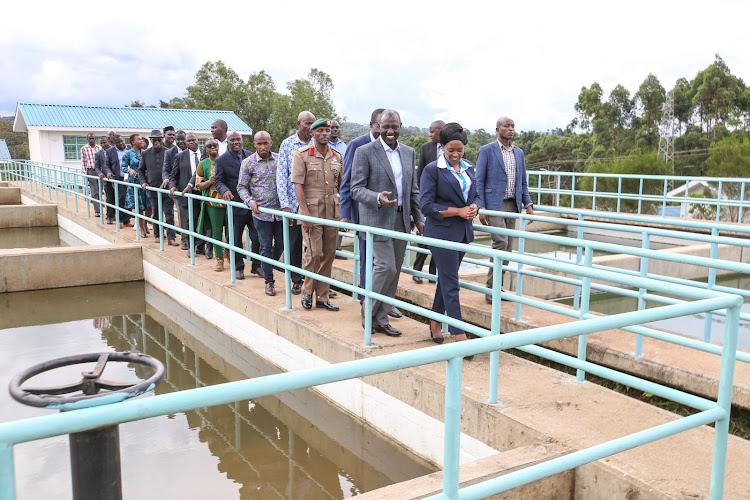Africa-Press – Kenya. Kenyans could be slapped with higher water bills under the public-private partnership deals being pursued by the Kenya Kwanza administration.
President William Ruto’s administration is banking on water purchase agreements to help meet the Sh500 billion budget gap for the projects.
The agreements would be entered into with private sector players to help them recover the money they’ve invested in mega dams and water delivery facilities.
But details show that the government would pay the companies for water that is delivered, whether the same is used or not.
Just like the arrangement with independent power producers, partly blamed for the high costs of electricity, the bills would be passed on to consumers.
A presentation by the PPP Unit of the National Treasury to the Water ministry seen by the Star has revealed the obligations of parties to the deal.
Part of it shows that the contracting authority – water and sewerage companies – would operate on a take-or-pay arrangement with the investors.
“Obligations of the contracting authority would be to take and pay for (and if not taken, pay for) the water conveyed to the delivery points as stipulated in the WPA,” the presentation reads.
President Ruto’s team has rolled out an ambitious plan to construct 263 dams across the country, including the Itare, Arror and Kimwarer dams that were controversially terminated during Uhuru Kenyatta’s tenure over alleged graft.
The Kenya Kwanza administration, according to the plan, seeks to put up at least a large dam in each of the 47 counties.
The projects are estimated to cost more than Sh500 billion hence the bid to have them put up by private sector players.
A draft agreement seen by the Star indicates that there would be a standing “water capacity base charge” and “water capacity charge” as part of the incentives to the private sector.
“Water Capacity Charge means the payment throughout the operation period comprising the water capacity investment charge and the water capacity fixed operation and maintenance charge,” the draft deal reads.
In the plan, the contracting authority would provide the project site – land and other related data, as well as procure permits.
The state would also pay any termination payments should the agreement fail to hold, as well as provide a viability funding gap – if any.
Taxpayers would also be in charge of paying for demand risk – which is a risk associated with throughput levels being different from the forecast levels.
Also to be borne by taxpayers would be the consequences for missed revenues and costs.
“The demand risk will be borne by the contracting authority and the project company will be compensated through availability payments and volume payments,” the plan shows.
“Where the water available to the project company at the source is less than anticipated, the contracting authority would bear the risk and remain liable to make availability payments to the project company notwithstanding such risk,” PPP disclosed.
A company entering into the arrangement, the presentation shows, would be required to finance, design, construct, and commission the water facility.
“This would be in accordance with the technical requirements,” the PPP unit said.
They would also be the ones to operate and maintain the water system during the term of the contract with the water companies.
The companies would also be required to make available portable as well as irrigation water production capacity.
Private firms would also be required to sell and deliver portable or irrigation water output to the contracting authority at the connection point.
At the end of the contracting term, the companies would be required to transfer the water plant system to the contracting authority.
Among the projects in the pipeline under the arrangement include the Mzima Springs, which is expected to provide 105,000 cubic metres of water.
Ndarugu II water project would also be executed under the arrangement, and so would the Galana Kulalu irrigation scheme, which is set to cost about Sh6.6 billion.
Ruto team also plans to use the PPP framework to finalise the Maragua IV dam, concession Karimenu Dam, High Grand Falls and Sabaki water supply projects.
For irrigation, the PPP unit has singled out Galana, Thuci, Lowaat, High Grand Falls, Radat, Rwabura, Thiririka, Yatta, Kithinu Multipurpose, Gogo, Narosura, Karimenu, Naromoru and Maara dams have been earmarked.
Portable water projects set aside for PPP deals include Keben, Bonyunyu, Two Rivers, Aberdare Bulk Water, Malewa, Pesi, Kithino, Galana downstream works, Bosto, Muhoya dams among others.
Even so, taxpayers would bear the political risks associated with the project, “because the project company cannot reasonably be expected to bear any of the risk.”
The argument is that the project company may price in such a high contingency in respect of the risk that it makes the project unaffordable.
For More News And Analysis About Kenya Follow Africa-Press






